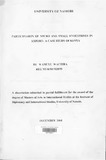| dc.description.abstract | The importance of Micro and Small Enterprises (MSEs) has been highlighted in various government publications and policy papers. Regional markets have opened up opportunities for Micro and Small Enterprises to engage in exporting activities, which include COMESA, the East African Community, The European Union and the North American markets.
Despite the opportunities created as a result of these trading blocs and markets, as well as the government's initiatives to enhance and try to implement good policy guidelines in the realm of MSEs engaging in exporting activities, MSEs still face many challenges which hamper their participation in export activities. These includes-: poor infrastructme, high taxation, political instability, lack of adequate credit, high insurance costs, lack of contacts and genuine trading partners, as well as high levels of competition.
The government has attempted to formulate an appropriate policy environment for MSEs to operate in by drafting various policy papers including Sessional Paper N02 of 1992 which aims at promoting and facilitating the operations of MSEs. Furthermore, strategies to enhance MSE activities have been well articulated. However only a small proportion of MSEs engage in export activities as compared to those engaging in businesses that depend on the local market. This is well illustrated in the survey data where only 30% of the MSEs surveyed engaged in export activities.
In order to enhance MSE participation in export, the government should continue to modify and implement the policy framework especially aimed at facilitating access to affordable credit, reducing taxation and insurance tariffs, improving physical infrastructure, enhancing entrepreneurship training and availing information on how to access foreign markets by MSE operators.
This study is divided into five chapters. Chapter One dwells on the methodology and theoretical framework as well as the literature review of MSE activity in a global perspective. Chapter two discusses the overview' of Kenyan Micro and Small Enterprise sector, deiving into the historical background of these enterpnses as we1l as discussing the overview of their structure, roles that they play and the problems that are expenenced
by the enterprises
Chapter three discusses the government policies on the promotion of MSEs in Kenya. Chapter four examines the survey data of the research that was undertaken on MSEs that participate in exporting activities. Finally, chapter five presents the conclusions and recommendations made for the research that was undertaken. | en_US |

